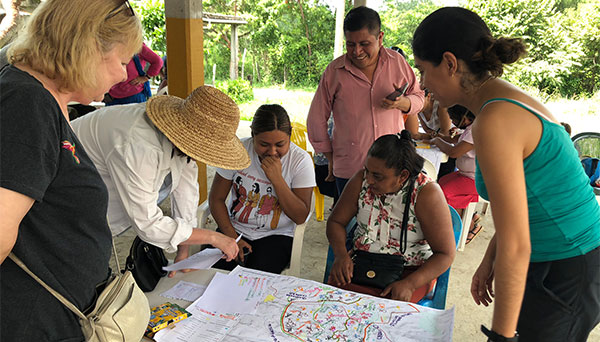Katuxawat Totonaca Community Learning Model (Cultivating Life) for Environmental Justice
Organization: Consejo Totonaco de Organizaciones y Comunidades
Purpose: To recover ancient values and Totonacan knowledge which, in the current context of community environmental education, will strengthen the identity, transgenerationality, gender equity and co-creation of traditional techniques and sustainability.
Location: State of Veracruz, municipality of Papantla.
Communities benefiting directly from the project: Gildardo Muñoz, Plan de Hidalgo, El Tajín and Reforma Escolín.
Country: Mexico
Other Organizations Involved: The community assemblies in each pilot community (Gildardo Muñoz, Plan de Hidalgo, El Tajín and Reforma Escolín); Consejo para la Protección y Preservación de la Ceremonia Ritual de Voladores, TSUMAT Artesanas Totonacas and Fomento del Patrimonio Cultural Totonaca, A.C.; Consejo Estatal de Productores de Vainilla Veracruzanos, A.C.; The research collective at Universidad Nacional Autónoma de México (UNAM) and Universidad Veracruzana (UV); and the civil associations Coco Tortuga, A.C., ITZENI, A.C. and Soluciones Circulares, A.C.
 @ Consejo Totonaco de Organizaciones y Comunidades
@ Consejo Totonaco de Organizaciones y Comunidades
Background
Communities in the Totonacapan regions are highly vulnerable to the hydrometeorological threats impacting biodiversity, health, society and agriculture. However, tlan latamat (the Totonacan model of good living) relates to katuwan (healthy natural world), basic health services and welfare programs. In this sense, the project intends to revitalize the katuxawat community learning model (cultivating life), through sustainable management strategies to increase resilience and environmental justice in Totonacan communities in the Plan de Hidalgo-El Tajín micro-region.
Goals
Response to climate change and increased individual, social, cultural and natural world resilience, based on cultural regeneration (katuxawat), nurtured and strengthened by the regeneration of their ecosystems (katuwan).
Main activities
- Fostering the exchange of knowledge with regard to community environmental education and environmental justice.
- Promoting Indigenous seeds of ecological, cultural, nutritional, health (traditional medicine) and economic importance, and fostering citizen engagement to create a community seed bank.
- Co-creating a school nursery for participative reforestation programs.
- Establishing a multipurpose traditional agroforestry system (makgatama) for vanilla and food products, to be used as a space for conservation and sharing ancestral knowledge, as well as exchanging backyard production approaches with new producers, thereby promoting an economy of solidarity, respect and justice with the environment.
- Co-creating a sustainable center to resume and reassess traditional household knowledge, as well as knowledge about renewable energies and ecotechniques, to increase climate resilience.
Outcomes
Revitalization and transfer of traditional knowledge, as well as scientifically validated techniques; fostered citizen awareness and local learning on environmental management; and the promotion of reforestation to reproduce natural botanical bioarchitecture to increase climate resilience.
The improvement of ecosystem services and the fostering of learning with respect to sustainability and ecological management will benefit the Totonacan populations in Plan de Hidalgo, Reforma Escolín, Gildardo Muñoz and El Tajín (Papantla, Veracruz), as well as other communities in the municipality and surrounding regions, and more specifically youth, women, producers and schools in the communities.